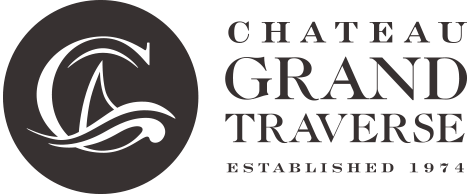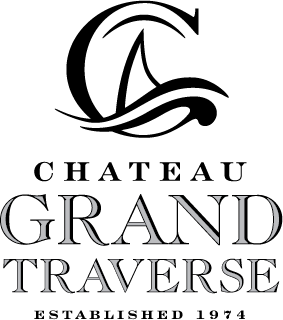Sustainability
What we do to protect our environment
Sustainability
Chateau Grand Traverse was the first winery in Michigan to pioneer the commercial success of vinifera grape growing and established Old Mission Peninsula as an American Viticulture Area (AVA). We are also proud to be a leader in viticultural practices and environmental sustainability. As committed stewards of the land, we recognize the importance of the environment and our responsibility to provide for future generations. We focus our efforts in a variety of areas in the vineyards, winery, and community. Below is an overview of some of our significant efforts to date.
Integrated Pest Management
We use Integrated Pest Management (IPM) for our insect and disease management. IPM is a systems approach to pests and diseases that combines an array of farming practices with careful monitoring of pests and their natural enemies to prevent crop damage.
Cover Crops
We actively plant green cover crops of beneficial grasses and grains to combat erosion as well as promote a habitat that attracts beneficial insects, birds and predators to the vineyards.
Composting
Each year, we strengthen our soil fertility by using local poultry and dairy manure compost, leaf mulch, wood chips as well as pumice (fermented skins and seed) and lees recycled from the winery operations. This mixture is spread on our vineyards after harvest and helps feed our soil, nourishes our vines, as well as provide weed preventative measures.
Erosion Control
As an ongoing practice, we continue to improve vineyard roadways and drainage system waterways to prevent further soil erosion around property.
Bird Habitat
We use bird boxes to attract predator Kestrels to help combat rodents. Our winery was recognized by the Saving Birds through Habitat, for establishing a “bird friendly” habitat encouraging numerous species to inhabit the property. We erected over 35 houses to attract bird, bat, and predator species. We documented over 45 bird species now living on the vineyard property.
Vine Balance
We continually work on achieving vine balance, essential to producing expressive and flavorful wines. Our viticultural practices, including shoot thinning, leaf pulling, crop thinning and irrigation management, all lead toward growing grape vines that match our climate, vine vigor, soil type, crop size and canopy.
Hazardous Materials Management
We maintain a Containment Building for washing down all vineyard equipment as well as the safe storage and mixing of any spray materials. We also installed safe fuel handling stations and proper storage facilities to contain any materials that could potentially seep into groundwater.
Modern Equipment & Mechanization
Our equipment is new or current technology that is regularly maintained for efficiency. We employ the use of mechanical weeding methods and specialized mowers to control weeds and reduce the need for herbicides. By doing so, we also eliminated the use of all pre-emergent herbicides in our estate-owned producing vineyards. Within our winery facilities we installed environmentally friendly and efficient air conditioners, tank chillers, furnaces, as well as low flow toilets.
Solid Waste Reduction & Management
We utilize a wide-ranging winery recycling program for most reusable materials including glass, cardboard, pallets, stretch wrap, batteries, fluorescent bulbs, and office generated paper. In addition, we installed an updated an efficient winery septic system with the low emissions. Parking lot runoff is captured and routed to a holding pond for settling and evaporation.
Elimination of Chemicals
We use no chemicals for cleaning or sanitation. By using means such as hot or ozonated water, steam, pressure washing, scrubbing with hydrogen peroxide, we are able to effectively sanitize our winemaking facilities. By the use of positive pressurized rooms, and clean practices, we are able to effectively control fruit flies and or other pests.
Employee Safety & Training
We are proud of our employee safety practices in both our winery and vineyards. Program components include: Safety training, materials handling, confined space procedures, prevention planning, and preventive maintenance. We hold regular meetings among staff to evaluate procedures and practices for a safe workplace environment.
Notable Activities and Recognition
MAEAP Certified: (MAEAP: Michigan Agriculture Environmental Assurance Program). This program certifies that our farming practices conform to the highest environmental standards set forth by the State of Michigan.
Adopt A Highway Program
Active participant in this program since its inception in 1990.


